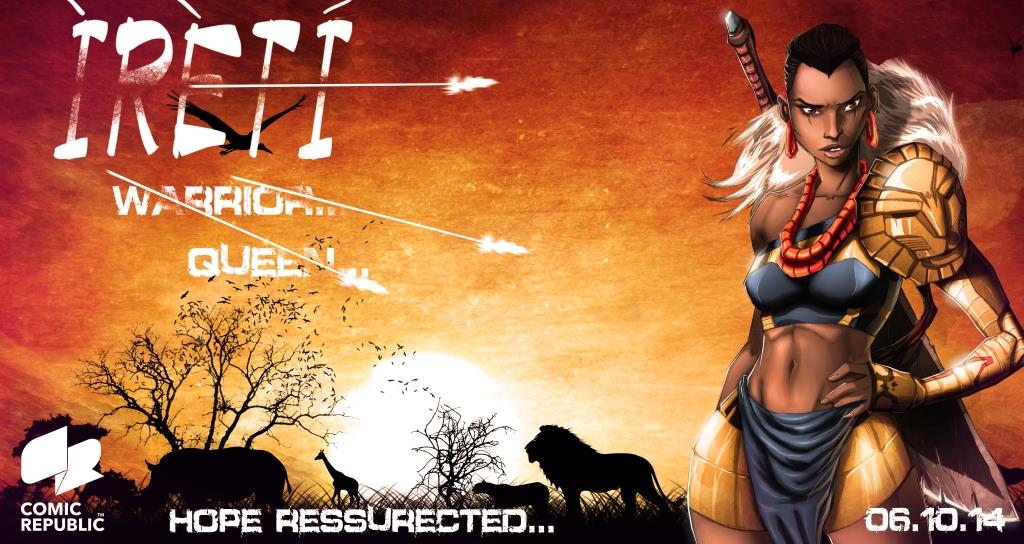“Ireti” is presented as the first “African superhero.” Source Comic Republic image. Used with permission.
When “Black Panther,” an American superhero film based on the Marvel Comics character of the same name, premiered in 2018, it marked a milestone as one of the first black heroes in mainstream American superhero films. With its huge success, the film also highlighted the lack of representation regarding how Africans are portrayed in Hollywood and the comic genre.
While locally produced superhero comics written by Africans for Africans have gained fame since the late 1980s, the popularity of African comics skyrocketed in 2016, largely due to the rise of superhero movies, such as those made by Marvel Studios.
Captain Africa [en, come tutti i link successivi, salvo diversa indicazione] was the first African and superhero comic to be recognized globally. Written and illustrated in Ghanaian Andy Akman in the 1980s and published by African Comics Limited, a Nigerian publisher, its success it slowly waned in the 1990s until it vanished into oblivion.
Despite his passing, Captain Africa has become the foundation which inspired a new generation of independent artists and comic book publishers across the continent. These have told stories that appeal to a true African audience who want more diversity, representation and authenticity in their stories.
Blank Panther paved the way for African superheroes and set a precedent for how black and African comic creators could “switch” their heroes from print to screen to tap into expanding geek market and a legion of fans around the world.
“BLACK” Comics
In October 2020, Warner Brothers announced that it would film adaptation “BLACK“, A comic created by Kwanza Osajyefo and Tim Smith 3.“ BLACK ”tells the story of how a young man survives a violent event only to realize he has powers. He is soon chased by a secret consortium that wants to control his abilities. The comic explores a double reality where only people of color have superhero powers.
If you’ve not read BLACK by Kwanza Osajyefo, Tim Smith 3, and Jamal Igle, you should order a copy now. It’s a book perhaps more than any other made for this moment, supposing what would happen in the real world if Black people and only Black people suddenly manifest superpowers. pic.twitter.com/Qgt37ps4rO
– Comics Bookcase (@ComicsBookcase) June 3, 2020
If you haven’t read BLACK by Kwanza Osajyefo, Tim Smith 3 and Jamal Igle, you should order a copy now. It’s a book perhaps more than any other fact for this moment, which speculates what would happen in the real world if black people, and they alone, suddenly manifested superpowers.
Kwanza, who began his career as an intern at Marvel Entertainment, came up with the concept of “BLACK” over a decade ago and was able to print the six-issue comic after a Kickstarter campaign that helped him and his co-creators to raise $ 90,000 to launch the project.
The series received critical acclaim and became a prime example of diversity and representation in comics. The creators are already working on the sequel “WHITE,” which explores what happens when America discovers that black people possess superhero powers.
“Aya of Yop City”
“AYA”Is a 2013 French animated film directed by Marguerite Abouet and Clément Oubrerie based on their graphic novel “Aya from Yop City“.
Prior to its film adaptation, “Aya from Yop’s City” she became a very popular comic series, translated into 15 languages, about life in Abidjan, Ivory Coast, in the 1970s. Published between 2005 and 2010, the series contains six volumes that trace the childhood memories of author Marguerite Abouet, who grew up in Yopougon, a working-class neighborhood on the outskirts of Abidjan.
After the release of the film, it quickly became a winning mix between a soap opera and a comedy, earning a nomination for Best Animated Film at the César Award in 2014.
“Malika”
“Malika”Is an African historical fantasy graphic novel inspired by a true West African warrior of the 16th century, Queen Amina of Zazzau.
The film adaptation of “Malika” debuted on YouTube in October 2019 after a Kickstarter campaign that helped raise $ 10,000 by 285 supporters. While it hasn’t received the overwhelming success of adaptations like Aya, received rave reviews by criticism and by fan.
The comic, released in March 2016 in three volumes, it follows the exploits of Malika, queen of the nation and military commander, as she struggles to keep the peace in her ever-expanding empire.
The comic was created by Roye Okupe, originally from Lagos, Nigeria. His passion for animation led him to found YouNeek Studios in 2012, a venture that would allow him to pursue his dream of creating a diverse superhero library.
YouNeek has since raised more than $ 70,000 on Kickstarter to adapt other of its comic series such as “EXO”, “WindMaker” and “Iyanu” into films.
Ireti
“Ireti” is presented as the first film on a “African superheroine“. Comic Republic of Nigeria – Africa’s largest independent comic book publisher – has signed a production deal with Emagine Content and JackieBoy Entertainment to kick off the film.
Conceived by Michael “Balox” Balogun and illustrated by Yussuf Adeleye, “Ireti” tells the story of Ireti Bidemi, a college student from Ibadan, Nigeria, who fights crime in style after being blessed with the powers of an ancient warrior queen. .
While “Ireti” is the first of the Comics Republic catalog set for film and TV adaptation, many more are in the works, including “Aje,” a fantasy comic inspired by Yoruba spirituality and mysticism, and “The Vanguards” inspired by an Avengers-style team of superheroes.
The “Supa Strikas” series
Considered one of the most popular comics in the world with more than 1.4 million copies sold each month in 16 countries, “Super StrikasIs a Pan-African football themed comic series that has been in publication since 2000.
First published in South Africa, the comic’s distribution expanded to the rest of Sub-Saharan Africa in 2002. It is arguably the first African comic to enjoy immense commercial success in the form of global titles, sponsorships, product placements , as well as full page advertising.
The title became a animated TV series in 2009 produced in Malaysia by Animasia Studio and Strika Entertainment of South Africa.
“Supa Strikas” combines humor, action, technology and exploration in the context of football matches. The story centers on the team’s youngest striker, Shakes, who many believe is the best striker in the world. Themes explored include self-fulfillment, fair play, teamwork and respect.
“Strike Guard”
“Strike Guard” is one comic series ebook set in Lagos, Nigeria, which revolves around a fictional character named Ayodele Elegbahe, a student of the University of Lagos who is killed and thrown into the tomb of the Yoruba deity Ajagbeja. He has a chance to come back to life with Ajagbeja’s spirit using his body as a host. Young Ayodele agrees and becomes Lagos’ crime fighter, Strike Guard.
Rooted in Yoruba spirituality and culture, the series also incorporates the contemporary African lifestyle. The superhero comic is a creation of Somto Ajuluchukwufounder and creative director of Vortex Comics, a Lagos-based company that creates comics and cartoons rooted in African culture.
The animation adaptation debuted at Lagos Comic-Con 2017 as a concept short of 9 minutes created in collaboration with SPOOF! Animation.
Yasuke

Yasuke, the Netflix anime series inspired by the African Samurai
Though “Yasuke”, the Netflix anime about an African samurai who debuted in April 2021, does not strictly fall into this category of comics that have been adapted to the cinema, it deserves a mention.
Yasuke was an African who became the samurai of one of the most famous warlords of medieval Japan in 16th-century feudal Japan. He has evolved over the centuries into the mythical legend featured in numerous manga comics and an icon of popular culture outside of Japan.
Following its premiere, the Netflix series “Yasuke” was considered as a “turning point” among black anime fans. Its significance as a turning point in the depiction of a black hero of animation has further rekindled the discourse on the representation and stereotypical characterization of black characters in cinema.
Seven African comics and graphic novels chronicling the experiences of blacks are adapted on film

